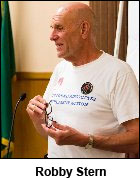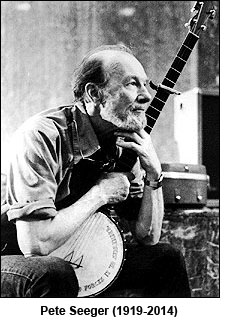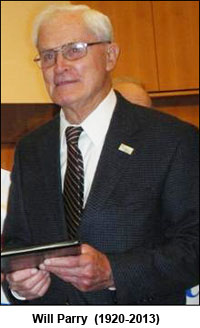OPINION
Pete Seeger, Will Parry, and the arc of an activist’s life
 By ROBBY STERN
By ROBBY STERN
(Mar. 5, 2014) — The arc of life has been on my mind lately. Turning 70 this month has led me to think about youth and the aging process. I have been thinking about how Pete Seeger was a presence from my early years, and how the friendship and influence of Will Parry has impacted my middle and senior years.
I was first exposed to Pete Seeger by my immigrant parents who had a copy of the Weavers album in their record collection. My age was in the single digits when I first heard “Irene Goodnight” and other folk songs on that album. I knew nothing about the political views of the singers and I frankly do not know if my parents knew anything about their political perspective. I do know we loved the music.
I remember vividly the fear my parents, and particularly my father, felt during the McCarthy era. Both were constantly fearful as a result of their experience in Nazi Germany. While it was never discussed with me, I believe that the McCarthy era had too many parallels to their early experiences in Germany before my Dad was taken to a slave labor camp. Pete and Will were victims of this terrible, repressive time in our country.
I did not hear Pete Seeger’s music, other than that Weavers record, until I left the place of my birth, Charlotte, N.C., and entered Syracuse University in 1961 at age 17. At the time, I did not know the connection between the disappearance of Pete from television and radio and the McCarthy era witch hunts.
 Upon entering college at Syracuse, I became more aware of the fundamental justice of the civil rights movement. I was particularly impacted when attending a meeting with several of the Freedom Riders and hearing the story of their beatings and close encounters with death. Folk music and freedom songs were thoroughly integrated into the emerging movements for fundamental change. Pete Seeger was one of the voices heard frequently as we struggled to define what needed to be done and what each of us individually was willing to do and to risk.
Upon entering college at Syracuse, I became more aware of the fundamental justice of the civil rights movement. I was particularly impacted when attending a meeting with several of the Freedom Riders and hearing the story of their beatings and close encounters with death. Folk music and freedom songs were thoroughly integrated into the emerging movements for fundamental change. Pete Seeger was one of the voices heard frequently as we struggled to define what needed to be done and what each of us individually was willing to do and to risk.
The arc of my life had changed dramatically as more and more I viewed myself as an activist trying to correct the ills of our country. Music and singing was an integral part of our picket lines and marches. I had not yet gone to jail during the early to mid ’60s, but I heard and read about brave people, young and old, singing songs before they put themselves in harm’s way or when they were in jail together. Pete Seeger, the Freedom Singers, Bob Dylan, Phil Ochs, Joan Baez, Buffy St. Marie and more filled our souls with optimism, determination and spirit.
I first had the opportunity to see Pete sing in the HUB ballroom at UW in the latter part of the ’60s when opposition to the war in Vietnam was growing stronger. He was traveling to college campuses across the country with his message of resistance and determination. We sang with him and we listened attentively as he passionately and angrily insisted we have to “stop this damn war.” I was moved by his commitment and his undying belief that we could stop the powerful U.S. government if we had the determination and the will to keep fighting.
From that time forward, I probably saw Pete in person two or three times and on television a number of times. His songs and his music became part of my penchant for singing during the course of my life. Pete had a deep commitment to justice for working people and the labor movement. My trajectory from the civil rights, anti-war and anti-imperialist movement of the ‘60s and ’70s into activism in the labor movement followed the connections that Pete had already made with his music, guided by his political commitments. He was an activist and a cultural worker, and whenever I encountered his music, energy and caring, it gave me greater strength to carry on.
Pete was ahead of me in age, understanding of the world, comprehension of what needed to be done and knowledge of how difficult a challenge we faced. So, it is no surprise that he understood the need to confront the issue of environmental sustainability way before I did. His work in cleaning up the Hudson River and inspiring tens of thousands of people to become active for the survival of our planet stands out as a remarkable achievement.
 Will Parry was the moving force behind PSARA becoming active in the fight for environmental sustainability. He passionately advocated for PSARA involvement as a fundamental responsibility to the generations behind us. He led us in calling for opposition to the coal terminals and the coal trains while insisting that our role was to fight for good union family-wage jobs as part of transitioning from fossil fuels to other sources of energy.
Will Parry was the moving force behind PSARA becoming active in the fight for environmental sustainability. He passionately advocated for PSARA involvement as a fundamental responsibility to the generations behind us. He led us in calling for opposition to the coal terminals and the coal trains while insisting that our role was to fight for good union family-wage jobs as part of transitioning from fossil fuels to other sources of energy.
I was mightily influenced by Pete and by Will to integrate these two critical issues: the struggle for environmental sustainability and the fight for social and economic justice.
Turning 70, I confront having a lot less time left than what is already behind me. Pete and Will exemplified what it means to engage in a lifelong fight for a decent society and a caring world as part of the very core of our individual existence. I will try to emulate them. Their presence in the arc of my life has been a blessing.
Robby Stern is President of Puget Sound Advocates for Retirement Action and serves on the Executive Board of the Washington State Labor Council, AFL-CIO. This column originally appeared in PSARA’s Retiree Advocate newsletter and is crossposted here with the author’s permission. For more information, visit www.PSARA.org.





